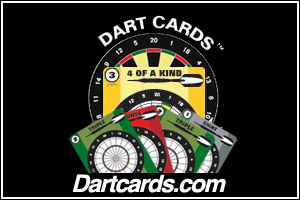What every new player should know about playing league darts
Time and time again we hear how newer players to the world of darts have never had anything formally explained to them and, since you can't know it unless you have it explained to you, we're going to cover some of the basics that should ensure a fun evening of darts for you and your opponents.
Chalking:
Chalking is probably the number one issue and the truth is that few people enjoy it. Let's face it, however - if you allow others to chalk for you it's only fair that you do the same. We'll get to the math issue in a moment, but for now here are a few things to watch out for:
- Face the chalkboard and in the direction of the dartboard. You shouldn't be able to see the players and you need to stand still. If you have to move - like to scratch an itch or to erase some of the chalkboard, for example - wait until a player has thrown all 3 darts to do it. It's unlikely that a player's missed dart would be your fault but most people would agree that the fewer distractions a player faces while throwing, the better.
- You are to be indifferent toward both players. Even if one is a friend or a teammate, you are there to simply chalk their match and not to root for one player or another.
- Don't speak unless spoken to. The only time you should say anything is to call out a player's score immediately after he or she has thrown 3 darts. Most times a player will simply call out the score as he or she grabs their darts from the board but you always retain the right to confirm the score prior to any darts being removed. If a player is removing his or her darts before you get a chance to confirm the score, politely request that they leave them in the board until you can do so. If you need to go right up to the board to figure it out, do so.
- You are permitted to tell a player what they have hit and what they have remaining, but only if they ask and you can not suggest an out shot. Period. Even if you are asked "what they should go for", you cannot tell them.
- If you reach the bottom of the chalkboard and run out of room, let the players know you will be erasing some of the board. Do not erase everything, but rather leave the previous 2 or 3 scores at the bottom of the chalkboard and only erase the top two-thirds for the new scores. This serves to show the players how their scores have gone down and eliminates any second-guessing that there were errors.
- When recording scores, use two columns on each side of the chalkboard for scores hit and scores left and always keep them in the same order on both sides. When a new score is to be recorded, simply draw a line at 45 degrees through the score hit and score left so that only the current score is showing. This provides everyone with an account of how the scores have transpired throughout the match and it gives the players a chance to agree or disagree with you before their next throw.
- All scores become absolutely final once a person has thrown a dart on his or her next turn. These are the rules. Everyone has a chance to examine the scores while their opponent throws and if he or she wasn't paying attention, so be it.
- Do not touch another player's darts while they are in the board.
- Lastly, be on time. If you know that you're chalking, be courteous and go to the bathroom or for that smoke well before the match is to begin. Nothing's worse than having to wait for a person to come staggering in, pint in hand, 5 minutes after you've been ready to start. At the very least, pre-arrange with a teammate to chalk for you.
And that's that.
People really do appreciate your help and both players should, as a matter of etiquette, both thank you for chalking and shake your hand. We've all known people who mysteriously disappear when a chalker is needed and there will always be people like that, unfortunately. Our advice to you is to not be that person and to at least offer to do your share. If your league plays 14 matches a night and you have 8 players, 6 of you will need to chalk twice. One approach is to chalk a match or two at the beginning of the night, even if it's just to get them out of the way. Just do it. You'll be surprised at how quickly you become good at it, too.
The Math:
For some reason, a lot of people are just plain afraid of counting in public. The thought of having to figure out 336 minus 93 on the spot and in front of everyone freaks them out and chalking a match is the last thing they want to do. Well, the bad news is that if you're going to play league darts, you'll have to chalk some matches. Don't think that your trips to the bathroom just before it's your turn to chalk are fooling everyone - they've all seen it before and will call you nasty names behind your back for it! All kidding aside, here are some tips that with a little practice will help you greatly:
- If the score is near 100, round up to 100 and then subtract the difference. For example, if a player has 336 points and hits 93, just subtract 100 and then add 7 (100 minus 7 is 93). 336 minus 100 is 236. 236 plus 7 is 243. Simple.
- Round up or down to the nearest "10" and either add or subtract points as need be. 53 points is the same as 50 plus 3 or 60 minus 7, right? If a player has 162 points and hits 53, subtract 50 and then another 3. 162 minus 50 is 112 and 112 minus 3 is 109.
- Some people even think in terms of money and change. If you have a dollar and something costs 48 cents, most people quickly calculate that their change should be 52 cents. Well, hitting 48 points when you have a 100 to begin with is the same thing.
- Here's one that you're sure to love: chalk every match that you possibly can until you get good at it. If your teammates routinely practice on a Monday at the pub, go and chalk games all night. If you go to a blind draw somewhere, offer to chalk matches for people whenever you're free. If you're really new to it, simply explain to people that you're offering because you're new and want to get better at it. 99% of the time no one will argue with having a chalker.
And that covers the chalking and counting aspects of league play.
Talking Trash:
Now we'll move on to the grand old tradition of talking trash. You know these guys, they're the ones who tell you how great they are, how bad you are, and how they're going to go about beating you. That's all fine and good in some situations but there are a few things you should consider before you engage in that sort of thing:
- Know your opponent. Some people like to have a bit of fun with it and some don't. If you haven't established some sort of rapport with the person throughout the evening, err on the side of caution and just be respectful.
- Never talk down to a weaker opponent. This is just bad form and bullying and no one appreciates that. You can do it to a player of equal ability or to a better player but never to a weaker player. Also keep in mind that the weaker player may soon become a stronger player and you could be in for a rough evening on the board one night.
- Keep it light. A little bit of teasing is OK but any time you have a room full of males and beer flowing freely someone is bound to take something the wrong way.
Unsavoury Tactics:
It's an unfortunate thing, but you may run into a player or two who try to throw you off of your game by engaging in some of the following behaviours:
- Standing near an opponent and rattling the darts in their hand.
- Standing behind an opponent and mumbling "26, 26, 26" after they've just hit 26 points.
- Taking their time going to and walking away from the board because they've noticed that you have a fairly quick pace to your rhythm.
- Bending the wires on the board or slightly tilting the board while removing their darts.
- Saying things like "great dart" or "wow, another triple" after you throw each dart.
- Turning to look at you after they've had a good throw.
- Squeeze your throwing hand tightly during a handshake or fist-bumping your throwing hard harder than need be.
The list goes on but we're sure that you get the idea.
Now, and depending on how much you care, there are a few things you can do. Accusing someone of cheating without proof is never a good plan, but if you find someone's behaviour to be distracting, you can always politely ask them to stop. If the board seems crooked after that player has just taken his darts out, politely ask the chalker if the board looks straight or not. If he's taking his time because you like to play quickly, stand well back and don't hurry to get to the line when he's done. You can also avoid the whole handshake problem by simply fist-bumping with your non-throwing hand.
Some people call it "gamesmanship" and some call it "poor form". Whichever way you choose to view it, be prepared for it and, more importantly, be prepared how to react to it.
Always Shake Hands:
Every organised sport or game has its traditions and darts is no different. You should always shake the hands of your opponents before and after every match, followed up with a quick "thanks" to your chalker. If hygiene's an issue - and for some it is - simply do the classic "fist-bump". You may, from time to time, come up against someone who, for whatever reason, will choose not to shake your hand. Just be sure to offer all the same.
Knowing Your Outs:
It goes without saying that you probably want to do things as efficiently as possible and knowing your outs definitely falls into that category. This is even more true if you're playing a team game with a partner and you should make an effort to know some of the more basic outs. If your partner leaves you a double 20, for example, and your opponents are at 163 (not an out), try not to leave your side with a 5. If you hit a single 20 and a single 10, use your 3rd dart to bust the score. Your opponents can't win on their next throw anyway and it's just selfish to to try and hit that double 5 with your last dart.
You should also be familiar with anything under 100. If you have 74, for example, and 3 darts in your hand, you should know that triple 14 is your first shot and that a single 14 will leave you 60 with 2 darts, which is single 20 + double 20. Do yourself a favour and practice these - you'll not only increase your chances of winning, but you'll save your partner some grief as well.
Don't Blame Your Partners:
Part of playing in a league usually involves some team games. Some people enjoy them more than others, but the one thing that remains the same is that you really do need to be supportive of your partner and not blame him or her for a loss. Blaming doesn't help anything, and you might want to try talking to the person alone to explain your thoughts on his or her focus level or their level of play. There's nothing wrong with wanting to play well, but just keep in mind that not everyone is coming out to play amazing darts and that some people actually come out for the fun of it all.
Play To Your Level Or Above, But Never Below:
This is always a hot topic but it needs to be mentioned because we've all seen it. We're talking about the players who routinely play a division (or two, or three) below where they should be and even then they tend to play lower in their lineups, get virtually guaranteed personal points, and pat themselves on the back for being so skilled. Don't be that person. Weaker players know they're weaker players and don't need to play people twice as good as them. If you find that your skill level has grown to the point where you are consistently winning each week, approach a team captain in one of the higher divisions and ask about joining another team. Your teammates may be disappointed to lose you but they will understand and respect you for it.
Have Some Fun With It:
Above everything else, try to have some fun. Unless you're being sponsored and looking to make money out of this, it's just a night out and a chance to be with new friends. No one will remember 3 weeks from now who hit what double, so try to be a good teammate, remember your etiquette, and throw your darts.
This article is copyrighted material and is the property of Torontodarts.com. Please do not re-use or-repost in any manner without express written consent of this website.


